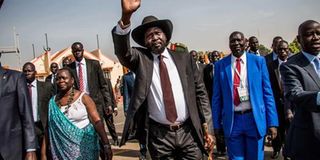South Sudan rebels ask oil firms to leave

South Sudan President Salva Kiir arrives for a political rally in Juba on March 18, 2015. PHOTO | ASHLEY HAMER |
What you need to know:
- Groups say the firms should shut down operations in the Upper Nile region immediately.
- Upper Nile is South Sudan’s only remaining crude-producing state.
South Sudan’s rebels want oil firms still operating in the country to shut down as “a matter of urgency” due to violence.
On Tuesday evening, the Sudan People’s Liberation Movement in opposition and allied groups under former Vice President Riek Machar said the firms should leave the Upper Nile region immediately.
“In response to the government’s full scale offensive on our positions in the three states of greater Upper Nile region, we have decided to take control of the oilfields and … (prevent) Salva Kiir from using the oil revenues to perpetuate the war,” James Gatdet Dak, the rebels' spokesman said.
“SPLM/SPLA leadership has asked all oil companies operating in Upper Nile state to shut down their operations and evacuate their staff immediately. We also ask them to do the process of closing down in a safe manner that will not damage the oil facilities and cause environmental damage.”
In March, fighters allied with Machar, often known as the White Army, announced they were mobilising to attack the Paloch oil fields that are the main source of revenue for the country’s military.
'DISMAYED' BY VIOLENCE
Upper Nile is South Sudan’s only remaining crude-producing state following the violence that has rocked the country for more than a year. China National Petroleum Corp., India’s Oil & Natural Gas Corp. and Petroliam Nasional Bhd, the oil companies operating in the neighbouring Unity State, had earlier shut and moved their employees.
The country which seceded from the Sudan in July 2011 had been producing 160,000 barrels per day from the Upper Nile, according to Juba. This generated about $15 million in revenue for the embattled government of Salva Kiir.
The warning by rebels came as a regional bloc, the Intergovernmental Authority on Development (Igad) which has been midwifing peace talks, said it was “dismayed” with renewed violence in Upper Nile.
“The Igad Mediation is deeply frustrated by the spread of violence to Upper Nile and strongly condemns this serious violation of the Cessation of Hostilities Agreement (CoHA) by SPLM/SPLA-IO and its allied forces,” Igad said on Sunday in a statement, the twelfth such warning they have given since the war broke out in Juba in December 2013.
“The Igad Special Envoys again urge the warring parties to adhere to the commitment they made in the eyes of their people and the international community, and resort to peaceful way of ending the crisis without further delay.”
On Tuesday, the rebels claimed they had “repulsed” government forces up to the oil fields and “captured” a Ugandan warship.
The Uganda People’s Defence Forces have been stationed in South Sudan since December 2013.
'LIES'
But in a quick rejoinder, the Juba administration said the rebels’ claim were “lies”.
“The rebels have perfected the use of propaganda. There is nothing like that; in fact in two or three days, they will be out of Malakal and will not set foot near the oil fields,” South Sudan’s Deputy Ambassador in Nairobi James P Morgan told the Nation.
“Please consider those lies. We don’t have Ugandan troops in Malakal, they are just in Juba and Bor. They claim they shot down a military helicopter but the picture they are showing is that of a Ugandan chopper which crashed in Kenya en route to Somalia in 2012.”
South Sudan, the world’s youngest nation at four fell into chaos in December 2013 after rebels loyal to former Vice President Machar engineered a failed coup against President Salva Kiir. Violence soon spread around the country.
Since then, mediation talks led by Igad, supported by the US, UK, Norway and the European Union, have failed to reach an agreement.




